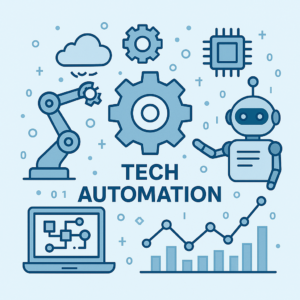Introduction:
Traditionally rooted in manual processes, the logistics industry is undergoing a profound metamorphosis with the integration of Artificial Intelligence (AI).
As we navigate through this blog, we\’ll delve into the key technologies propelling this transformation, explore real-world applications, and understand the far-reaching impacts of AI on the logistics sector.
Current Challenges in the Logistics Industry:
Industry Challenges:
The logistics industry grapples with various challenges, including inefficiencies and heightened customer expectations. These issues are further complicated by bottlenecks and growing environmental concerns.
Customer Expectations:
As customer expectations continue to rise, the logistics sector is under pressure to enhance its services.
Meeting these expectations requires innovative solutions that streamline operations and improve overall efficiency.
Environmental Impact:
Environmental concerns have become a critical issue in logistics.
The industry is increasingly aware of its environmental footprint, and addressing these concerns is crucial for sustainable and responsible business practices.
Bottlenecks in Operations:
Bottlenecks, whether in transportation, warehousing, or other facets of logistics, hinder smooth operations. Identifying and mitigating these bottlenecks is essential for optimizing the entire supply chain.
Real-Time Data:
The logistics sector faces a pressing need for real-time data. Timely information is crucial for making informed decisions and responding promptly to challenges. Lack of real-time data can contribute to delays and inefficiencies.
AI-Driven Solutions:
The aforementioned challenges create an opportune environment for the integration of AI-driven solutions. Artificial Intelligence emerges as a transformative force, offering the capability to analyze vast amounts of data in real-time and provide valuable insights.
Addressing Challenges with AI:
AI serves as a powerful tool to address the complexities of the logistics industry. From predictive analytics to route optimization, AI technologies can enhance decision-making processes, streamline operations, and contribute to overall efficiency.
Creating a Path for Innovation:
The urgent need for solutions to the challenges faced by the logistics industry paves the way for innovative approaches. AI not only addresses existing issues but also opens avenues for continuous improvement and adaptation in a rapidly evolving business landscape.
Key Technologies Driving Transformation:
Machine Learning in Route Optimization:
AI, specifically machine learning, is revolutionizing route optimization. Predictive analytics, powered by historical and real-time data, enables logistics companies to forecast demand accurately. This, in turn, facilitates dynamic routing, reducing delays, fuel consumption, and overall operational costs.
Internet of Things (IoT) and Sensor Integration:
Real-time tracking and monitoring of shipments have become possible through the integration of IoT devices and sensors. These technologies provide granular data on the location, condition, and status of goods, empowering logistics companies to make informed decisions and enhance overall visibility in the supply chain.
Robotics and Automation:
Autonomous vehicles, drones, and automated warehouses are at the forefront of logistics automation. Robotics streamlines various processes, from transportation to warehousing, reducing human intervention, minimizing errors, and significantly increasing the speed and accuracy of operations.
AI Applications in Logistics:
Smart Warehousing:
In the realm of smart warehousing, AI-driven inventory management serves as a transformative force, converting warehouses into highly efficient hubs. Automated systems, seamlessly integrated with machine learning algorithms, play a pivotal role in optimizing stock levels.
These systems mitigate the risk of stockouts and contribute to an overall improvement in warehouse efficiency.
Robotics, another facet of this transformation, introduces a new dimension to warehouse operational capabilities.
Automated robotic systems streamline tasks such as picking, packing, and sorting, further enhancing efficiency and reducing manual labor requirements.
Predictive Maintenance:
The landscape of logistics equipment management is undergoing a revolution through the implementation of predictive maintenance, fueled by AI. This approach fundamentally changes how logistics companies handle their equipment. AI leverages data from sensors and historical maintenance records to predict potential failures.
This predictive capability allows for proactive maintenance interventions, reducing unexpected downtime and extending the lifespan of crucial equipment.
By shifting from reactive to proactive maintenance strategies, logistics companies can significantly improve operational reliability and reduce overall maintenance costs.
Last-Mile Delivery Optimization:
The last mile of delivery, known for its logistical complexities, encounters a robust solution in the form of AI-driven optimization. AI algorithms take center stage in route optimization for delivery vehicles, addressing one of the most challenging aspects of the supply chain.
Machine learning algorithms analyze a myriad of factors, including real-time traffic patterns, weather conditions, and delivery windows.
This comprehensive analysis ensures the creation of optimized routes, enabling timely and efficient deliveries. Ultimately, this not only enhances the overall customer experience but also contributes to cost savings and operational efficiency for logistics companies.
As AI continues to evolve, its role in last-mile delivery optimization becomes increasingly integral to meeting the demands of today\’s dynamic and competitive logistics landscape.
Benefits and Impacts:
Cost Reduction:
One of the most tangible benefits of AI in logistics is cost reduction.
Operational expenses decrease as AI optimizes routes, reduces fuel consumption, minimizes human errors, and enhances overall efficiency.
Resource optimization becomes a reality, contributing to the financial sustainability of logistics operations.
Improved Efficiency:
AI streamlines processes, minimizes errors, and increases overall efficiency. Smart warehousing, predictive maintenance, and last-mile delivery optimization collectively contribute to a more reliable and efficient logistics ecosystem.
Human labor can then focus on more strategic and complex tasks, further enhancing the industry\’s productivity.
Environmental Sustainability:
AI-driven logistics plays a crucial role in environmental sustainability.
Optimization of routes for fuel efficiency, combined with the reduction of carbon footprints through smart logistics practices, aligns the industry with global efforts to minimize environmental impact.
This dual benefit of cost reduction and sustainability positions AI as a key driver for positive change in the logistics sector.
Challenges and Concerns:
While the advantages of AI in logistics are evident, challenges and concerns exist.
Data security and privacy, workforce adaptation, and ethical considerations in AI-driven decision-making are critical aspects that require careful attention and proactive solutions.
Future Trends:
As we peer into the future, the evolution of AI algorithms, integration with emerging technologies, and potential regulatory developments are poised to shape the next phase of logistics innovation.
Companies that stay ahead of these trends will be well-positioned for sustainable growth and competitive advantage.
Conclusion:
AI is the revolutionary conductor arranging harmonized activities in the big symphony of logistics. The significant advantages of incorporating AI into logistics are evident, ranging from route optimization to increased efficiency and sustainability.
The logistics sector is at a turning point, ready to innovate, adapt, and fully utilize AI\’s promise for a more efficient, sustainable, and connected future as we head into Logistics 2.0.
For the logistics sector, PQube offers a guiding light in this rapidly changing environment.
PQube is ideally positioned to enable logistics organizations to take advantage of the technical breakthroughs of Logistics 2.0, thanks to its dedication to innovation and proficiency in AI integration.










